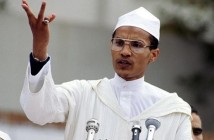(Jurist) – The Moroccan Human Rights Association (AMDH) [advocacy website, in French] Tuesday called for a judicial investigation into the circumstances surrounding the passage of a public referendum to adopt a new constitution. The group released a report that says it has evidence authorities used the state machinery to influence the referendum [Reuters report] on the country’s new constitution, calling for an immediate judicial investigation into the referendum’s legitimacy. The AMDH alleges that authorities used state media to sway public opinion and used religious pressure to encourage people to vote in favor of passage. Moroccan voters on July 1 overwhelmingly approved [JURIST report] a revised version of the constitution, highlighted by fewer powers reserved for King Mohammed VI. But some argue that the referendum only reflected half the vote, despite reports by the Interior Ministry, which ran the election.
Under the new constitution, Mohammed, who previously enjoyed almost absolute power, remains head of the army, but a variety of his other political powers are now held by the prime minister and parliament. In addition to curbing the king’s powers, the revision also guarantees more rights for women and makes Berber, an indigenous language, official. Mohammed announced the changes [JURIST report] last month, which many viewed as an attempt to put an end to the “Arab Spring” street protests that had been becoming more prevalent throughout the region. Prior to the king’s announcement, in April, thousands of protesters engaged in peaceful demonstrations [JURIST report], vocalizing their demands for greater reform to the constitution as well as an end to corruption within the country. Similar protests have occurred recently throughout the Middle East and North Africa [BBC backgrounder], and have resulted in the resignations of Tunisian president Zine al-Abidine Ben Ali and Egyptian president Hosni Mubarak [JURIST reports]. Protests were also widespread in Libya [JURIST backgrounder], where leader Muammar Gaddafi [BBC profile; JURIST news archive] and his inner circle have been accused of perpetrating violence against protesters [JURIST report].






